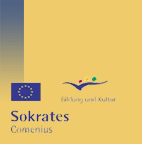|
Preparation:
A simple camera with a film in it as well as an old camera that has
been taken apart are ready for use.
Also: magnifying glasses, play dough, rulers, candles, matches,
tracing paper

|
Steps:
The children shoot photos
and think about how a picture develops.
Experiment with the old
camera: The children press the release and see what happens.
The children build a model
camera:
-
Use play dough to fix magnifying glasses to rulers
-
Put burning candles in front of the magnifying glasses (=lenses)
-
Hold a sheet of trancing paper behind the lenses
-
Go on moving the paper back and forth till a sharp picture of the
candle appears
-
The candle appears smaller, upside down and the wrong way around
-
The rulers measure the distance between lens and paper (=focal length)
Use other items and hold them the wrong way up and around in front of
the lens (they appear the right way up).
|
|
Scientific Explanation:
You shoot a photo by pressing the release. The shutter opens and light
penetrates through the lens and aperture and reaches the film. The picture
that is produced this way is upside down and the wrong way round.
The film contains a light-sensitive layer with silver salts. When this
layer is exposed to light, a tiny amount of metallic silver is produced. The
picture is not visible yet, it has to be treated chemically. The film is
developed and fixed. Then the photos are visible; the light spots appear dark
and the dark ones light.
|
Possible Variation:
|
Attention!
Finally the nursery school teacher has to explain how the film is
actually exposed: The silver layer fixes the picture.
|
Source:
Ardley, Neil: 101
spannende Experimente aus Wissenschaft und Technik. Bindlach 1996.
|











